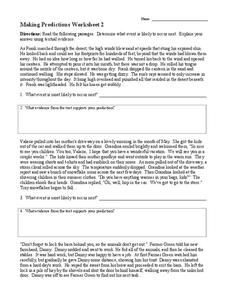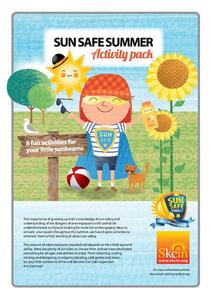Howard Hughes Medical Institute
Zebrafish and Skin Color
You may not know if that zebrafish in your fish tank is a model citizen—but it is definitely a model organism! What can we learn about ourselves from a tiny zebrafish? Discover more about the polygenic trait of skin color through a...
E Reading Worksheets
Making Predictions #2
What happens next? Learn to make predictions with five short passages. As kids finish reading each passage, they jot down what they think will happen next, as well as the evidence from the text that supports their prediction.
University of Colorado
Patterns and Fingerprints
Human fingerprint patterns are the result of layers of skin growing at different paces, thus causing the layers to pull on each other forming ridges. Here, groups of learners see how patterns and fingerprints assist scientists in a...
E Reading Worksheets
Making Predictions #3
Sometimes it's helpful for kids to predict what is coming next when reading a story. Show your learners how to use evidence from the text they are reading to predict what happens next in five short passages.
Nuffield Foundation
Going up in Smoke
Don't let all your hard work go up in smoke. Pupils conduct an experiment to see the harmful effects of cigarette smoke. They observe how smoke changes the color of white wool and an indicator solution.
Skcin
Sun Safe Summer Activity Pack
Eight activities make up a packet all about sun safety. Scholars mix and match how animals stay sun safe, dress paper dolls in appropriate summer clothing, make a cootie catcher, solve word puzzles, grow sunflowers, examine...
Curated OER
Easy Tie Die
Perfect for summer camp, an after school program, or your classroom, these instructions will make tie-dying a breeze! Simple instructions and helpful images make tie dying a fun and easy project. Tip: Have learners predict the outcome of...
Curated OER
Foundations (Face Make Up)
In this worksheet, students read about the 5 forms of foundation and the beneficial ingredients they can contain. Students read about the lifestyles of 3 people and match the appropriate foundation to each one.
Healthy Native Youth
Chapter 5: Learning About HIV/AIDS/STI's and Hepatitis Transmission
Middle schoolers delve deep into facts about HIV, AIDS, Hepatitis, and other STI's by way of discussion and a hands-on activity. Scholars ask and discuss questions anonymously using a Question Box. Two experiments showcase the...
Aquarium of the Pacific
Fish for a Day
A short video shows how a scuba divers' equipment relates to major parts of a fish. Learners draw two fish and identify what aspects are the same and which are different. The scholars then draw a scuba diver, making sure they provide all...
Curated OER
Makeup-- A Wealth of Minerals
Students examine how a variety of minerals are used in make-up. They discuss the minerals that are found in things like make-up, soap, shampoo, and toothpaste and determine where the minerals come from.
Curated OER
How to Make Mashed Potatoes
Focus on writing directions using this resource. Learners can read this description of how to make mashed potatoes, and use it as a template for their own instructions. This is a great way to give learners a clear idea of what it takes...
Curated OER
Skin: Skin Prints
Learners explore human anatomy by participating in a print experiment. In this human skin instructional activity, students define the term "epidermis" and utilize computer paper, pencils, tape and baby wipes to create a print of their...
Curated OER
UV Rays, sunscreen effectiveness
Students identify and define that invisible UV rays can be harmful. Then they explore the effects of UV radiation on objects that react UV rays and what products are most effective in blocking UV rays. Students also make predictions...
Curated OER
Human Cheek Cell
Get up close and personal with human cells with this lab worksheet. Learners use a microscope to examine their own cheek cells, drawing diagrams of the cells and identifying the parts when they have focused in on a visible specimen....
PBS
Blow the Roof Off!
Blow the minds of young scientists with this collection of inquiry-based investigations. Based on a series of eight videos, these "hands-on, minds-on" science lessons engage young learners in exploring a wide range of topics...
Curated OER
Periodic Table of the Elements
First graders discuss, at their level, the concept of elements making up all matter. They discover the story of Dimitri Mendeleev and his discovery of the Periodic Table of the Elements. They locate and color some of the most common...
Curated OER
Transportation Choices and the Environment
Students study statistics and charts pertaining to how transportation and other energy choices impact the environment. They participate in small group discussions regarding concerns for the future.
Roy Rosenzweig Center for History and New Media
American Indians and their Environment
People could take a page in ingenuity and survival from the Powhatans. Deer skins became clothes, and the members of the Native American group farmed the rich Virginia soil and hunted in its forests for food. Using images of artifacts...
Nemours KidsHealth
Human Body Series - The Five Senses
Get your class up and moving with these engaging hands-on-activities that target their five senses. Children explore four different work stations that require them to look, smell, hear, touch, and taste as they record their responses...
Freeology
Martin Luther King, Jr.'s "I Have a Dream"
Dr. Martin Luther King, Jr.'s speech "I Have A Dream" is hailed as one of the most eloquent and moving speeches of the 20th century. But what makes his words hit his listeners' ears in just the right ways? Young orators study Dr. King's...
American Museum of Natural History
Beyond T. Rex
Some dinosaurs get all the attention. Pupils use an interactive resource to study some of the lesser-known dinosaur species. Organizing the information in a cladogram allows learners to make connections among the species.
Howard Hughes Medical Institute
Spreadsheet Tutorial 4: t-Test
The t-test tutorial will fit your needs to a T. After calculating the mean, sum of squares, standard deviation, and variance of two data sets on a spreadsheet, scholars learn to calculate the t-values. They then learn to use the TTEST...
Curated OER
Tamar Burris
Students explore genetics. In this life cycle lesson, students consider the meaning of "genes" and "heredity" as they watch a video about the topics. Students then research their own genetic make-up as they interview family members....























